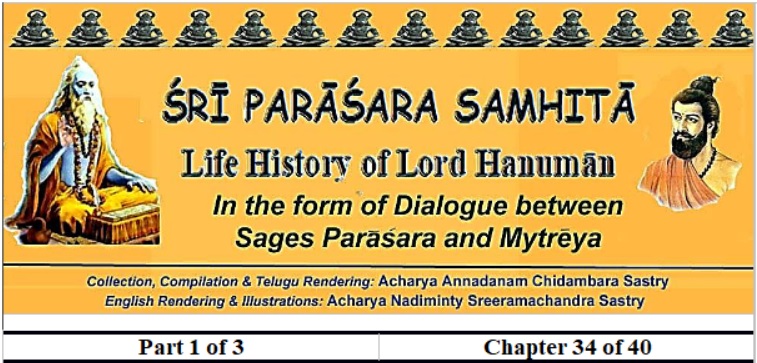
34th Chapter (Catustrinśatpaţalah)
“The Story of theHistory of Sumukha”
(Sumukhacaritrakathanam)
श्रीमैत्रये :-
श्लोक:
पराशर नमस्ते स्तु भगवन्करुणाकर !
सप्ताक्षरीप्रभावं मे कथय त्वं हनूमत:।। 1
Sage Mytrya:
“Oh! Sage Parāśara! The very form of the Almighty! Abode of kindness! I bow to you. Please tell me the impact of the Hanumān 7-Lettered (saptākşari) mantra. (1)
श्रीपराशर:
मूर्तित्रयात्मकं यस्य प्रणवं प्रथमाक्षरम्
मोक्षाय कल्पते भूय: मुमुक्षूणां महात्मनाम्।। 2
Seer Parāśara:
The Saptākşarī Mantra
“That Hanumān mantra, which has the soul of the Trinity (Brahama, Vişņu and Śiva) and the cosmic (prņava) letter (Ōmm) as its first letter is capable of giving salvation to all those great souls that desire it. (2)
सर्वसम्पत्प्रदं नृणाम् द्वितीयाक्षरमिष्यते
लक्ष्मीकलात्मकवर्णश्रीकारमिति विश्रुतम्।। 3
The Goddess Lakşmī-imparted second letter ‘Śrī’ in it denotes that it can give every type of wealth to people. (3)
विराट्स्वरूपसंकाशं हत्याकोटिशतानि च
तृतीयमक्षरं हन्ति हकारमिति गीयते।। 4
Form of the ever revered Ādidēva (Śiva), shines in the third letter ‘ha’ that frees one of the sins equal to that of billions of murders. (4)
तमो नुदति तत्कालं सूर्यमण्डलवर्चसम्
चतुर्थमक्षरं सद्य: नुकार इति कीत्र्यते।। 5
The fourth letter ‘nu’ is renowned as the darkeness-eliminating reddish hue of the Sun just after sunrise. (5)
चन्द्रमण्डलविद्योतं पव्म्चमाक्षरमुत्तमम्
ह्लादयत्सकलान् लोकान् मकार इति गद्यते।। 6
The fifth letter ‘ma’ that, like the glow of the moon, gives bliss to all. (6)
षप्ठवर्णं महापुण्यं त्रेताग्निसमधिष्ठितम्
चिनोति सकलान् धर्मान् तेकार इति चोच्यते।। 7
The sixth letter is the holy auspicious ‘tē’ that lives in the three holy fires and collects all the virtues. (7)
NOTE: The Three Holly Fires (Gārhapatyagni = domestic fire, circular in shape; located to the west; Ahavanīyagni = square in shape; located to the east; Dakşiņagni = semi circular in shape; to the south; there is also the Aupāsanāgni ( may be circular or square; to the north) and collects all the virtues.
सप्तमाक्षरमत्यर्थं ब्रह्मानन्दात्मकं पुन:
आनन्दयत्यमत्र्यान् वै नकार इति गण्यते।। 8
Full of great bliss and capable of pleasing even the gods is the seventh letter ‘na’. (8)
कालशक्तिमयं वर्णं अष्टमं कष्टनाशनम्
मारयत्यखिलान् शत्रून् मकार इति लक्ष्यते।। 9
With power eaqual to that of the equipoised Yama, the virtuous god of death, is the eigth letter ‘ma’; thus the mantra being ‘Ōmm Śrīm Hanumatē namah’. (9)
सो यं सप्ताक्षरीमन्त्रप्रभावो गदितो मया
न प्रपंचय मैत्रेय ! सर्वमन्त्रोत्तमोत्तमम्।। 10
The positive effects of the great 7-Lettered mantra of Hanumān is explained by me. Oh! Mytrēya! Do not reveal this greatest of mantras openly. (10)
उद्यद्रानमयूखमंडलनिभश्श्रीकुण्डलालंकृतो
य: पद्मांतरकर्णिकासमतनु: पीतांबरालंकृत:
तस्मै दिव्यविभूतये हनुमते वेदांतवेद्याय ते
चन्द्रादित्यहुताशचक्षुष इदं भूयो पि भूयो नम:।। 11
Dhyānam
I am bowing to you again and again – One that is equal to the bunch of rays emanating from the rising Sun, One that has radiant ear rings and a body like that of the central pericarp of the lotus, One that wears a yellow-green cloth, rich in divine btilliance, One that can be known through Upanişads and the One that has the Sun and the Moon as the two eyes. (11)
लक्षमेकं पुरश्चर्या दशांश: तर्पणं भवेत्
तद्दशांशो होमकर्म तद्दशांशस्तु भोजनम्।। 12
Puraścarya – Repetition Process
The repetition process involves recitation of the saptākşrī mahā mantra for 100,000 times. It was told that in that, 1/10th has to be Fire Sacrifice and – 1/10th anna samārādhana (serving food, rice). (12)
एवं कृत्वा मुनिश्रेष्ठ वाव्म्छासिद्धिर्लभेद्धु्रवम्
चतुर्णामपि वर्णानां मन्त्रो जप्यो न संशय:।। 13
Oh! Great sage Mytrēya! If performed so, wish will be fulfilled. Without doubt, people of the four castes can recite this mantra. (13)
त्रूणु मैत्रेय वक्ष्यामि इतिहासं पुरातनम्
यस्य श्रवणमात्रेण नरो भीष्टं समश्नुते।। 14
Oh! Mytrēya! I am telling the ancient history related to this. On hearing of it the wish of man will be fulfilled. So listen. (14)
श्रीभद्रं नाम नगरं सर्वलोकेषु विश्रुतम्
सुमुखो नाम तत्रासीद् द्विजो धर्मपरायण:।। 15
History of the Saptakşarī Mantra
There was a city named Śrībhadra famous in all the worlds. There was a virtuous Brāhmin named Sumukha in it. (15)
हनूमच्चरणध्यानविमलीकृतमानस:
सप्ताक्षरीजपपर: सदा ब्राह्मणपूजक:।। 16
He was inclimed to meditate upon the lotus feet of Hanumān. Always recites the saptākşarī mantra. Always worshipped learned Brāhmin people. (16)
हनूमत्प्रीतये नित्यं विप्राणामन्नदायक:
तस्यैव द्विजवर्यस्य कुर्वतो नियमं सदा।। 17
Presenting food gifts to Brāhmin people for the satisfaction of Hanumān, strictly as per the rules, (17)
समीपग्रामनिलयो गोपालो बहुगोधन:
धेनुमालीति विख्यातो नित्यमाज्यं प्रयच्छति।। 18
With the ghee brought daily by Dhēnumāli, a cowherd that possessed several cows. (18)
क्रयविक्रयसम्बन्धं तयोरेव प्रकुर्वतो:
व्यतीयाय महान् कालो हनुमत्करुणावशात्।। 19
By the grace of Lord Hanumān, as he was spending a nice life with the trade going on between them, (19)
एकदा गोपवर्यस्य स्कन्धेनाज्यं निनीषत:।
मार्गमध्ये गिरिनदी प्रावर्तत दिनद्वयम्।। 20
Once that cowherd was holding ghee (pot) on his head. On the way, the hill streams were flowing high with floods for two days. (20)
धेनुमाली नदीकूले तस्थौ तर्तुमशक्नुवन्
दिनद्वयं च मैत्रेय विप्रशापभयाकुल:।। 21
Oh! Mytrēya! Aftraid of the Brāhmin’s curse, but unable to cross the stream, Dhēnumāli stood on the other side of the river for two days. (21)
सुमुखो पि तदा तत्र विप्रानाहूय सर्वश:
आज्यं गृहीत्वा नायाति धेनुमाली महाद्विजा:।। 22
At that time Sumukha, having invited good Brāhmin people for food, told them that Dhēnumāli has not brought the ghee. (22)
तत्रांतराय: किं जात: घृतानयनकर्मणि
अद्य प्रतीक्षया तस्थौ हनूमन्तमितीरयन्।। 23
Thinking that there was some hindrance in bringing of the ghee, he was waiting for the same while reciting the name of Hanumān. (23)
भक्तवात्सल्यनिरतो हनुमान् करुणानिधि:
भक्तसंकल्पविहतिं न सेहे लोकनायक:।। 24
Hanumān, kind to His devotees, can never bear hindrance to their determination (sankalpa). (24)
तथा गोपालवेषेण स्कन्धेनाज्यं समुद्वहन्
दिनद्वयं च विप्राय ददौ वानरनायक:।। 25
In the garb of that cowherd, Hanumān, brought ghee on those days holding it on his head. (25)
एवं दिनद्वये तीते धेनुमाली समाकुल:
समारुह्मोडुपं कव्म्चिद्विप्रस्य निकटं गत:।। 26
After two days, worried Dhēnumāli used a boat and came to Sumukha. (26)
दिनद्वयस्य पर्याप्तमाज्यं बहु समुद्वहन्
आगत्य विप्रमुख्यस्य पपात चरणाब्जयो: 27
Having come carrying the ghee due for the past two days, he prostrated at the lotus feet of the learned Brāhmin. (27)
आज्यं गृहीत्वा नायाति गोपाल इति भूसुर:
माकृथा मयि कोपं त्वं मार्गकृत्यं वदामि ते।। 28
‘Oh! Virtuous Brāhmin! Do not get angry on me, the cowherd, for not bringing the ghee for two days. I will narrate what has happened on the way. (28)
मय्यायाते गिरिनदी मार्गमध्ये द्विजोत्तम !
कूलड्कषोदका जाता समर्थाे ना स्मि तारितुम्।। 29
Oh! Best of Brahmins! Because the hill rivulet flowing high cutting its banks, I could not cross it. (29)
तस्माद्दिनद्वयं तत्र स्थित्वा भीतसमाकुल:
गतो स्मि ते विप्रवर्य! आरुह्मोंग्मोडुपमंतिकम्।। 30
That is why I stood there out of fear and today rode a boat and could reach you now. (30)
मयि संस्थाप्य कारुण्यं मां च क्षन्तुं त्वमर्हसि।। 31
Hence, kindly be merciful and excuse me’. (31)
सुमुखो पि तदाश्चर्यं श्रुत्वा गोपालभाषितम्
मेने ह्माज्यप्रदातारं हनुमन्तकृपानिधिम्।।32
Listening to the bewildering words of the cowherd, Sumukha decided that the person that delivered ghee for the last two days is none other than Lord Hanumān. (32)
एवं मत्वा तदा विप्र: तुष्टाव जपतां वर:।। 33
Understanding thus, Sumukha, the best amongst the reciters started praising hymns as follows. (33)
नमस्ते वानराधीश ! नमस्ते राक्षसांतक !
नमस्ते वानराधीश! नमस्ते वायुनन्दन! 34
‘Oh! God of gods! I bow to you. The eliminator of demons! I bow to you. Best amongst the monkey clan! I bow to you. Son of Wind God! I bow to you. (34)
नमस्त्रिमूर्तिवपुषे वेदवेद्याय ते नम:
नमस्ते लोकनाथाय सीताशोकापहारिणे! 35
The soul form of Brahma, Vişņu and Śiva together! I bow to you. One that can only be known via Vēdas! I bow to you. Lord of the world! Remover of the grief of Mother Sītā! I bow to you. (35)
स्वामिन् त्वया कृतं हृद्य! यदाज्यवहनं मम
जातं ममापराधाय तत्क्षमस्व दयानिधे! 36
Lord! One with heart warming Form! Yourself carrying ghee is the cause of my fault. One full of mercy! Excuse me for that fault. (36)
त्वया यथा नियुक्तो हं तथाकुर्वे वचांस्यहम्
साधु वा यदिवासाधु मम दोषो न विद्यते।। 37
Almighty! As I have been carrying things daily, I was doing the same way that two days too. Wheather proper or improper, there was no fault of mine’. (37)
इति स्तुवन्तं विप्रेद्रं दृष्ट्वा वायुतनूभव:
तप्तकांचनसकाशं मुक्ताहारविभूषितम्।। 38
So invoking, the good Brāhmin saw the son of Wind God Hanumān, the One shining like the burnished gold, decked with a chain of pearls, (38)
दिव्यपीतांबरधरं मणिकुंडलमंडितम्
दर्शयामास चात्मानं इदं प्रोवाच तं द्विजम्।। 39
Wearing auspicious silks, radiant with His diamond studded ear rings, Hanumān said so to the Brāhmin. (39)
भवत्प्रतिज्ञां विपे्रद्र! सत्यां कर्तुं मया कृतम्
भक्तप्रेम्णाज्यवहनं गोपवेषभवत्तथा।। 40
‘Oh! Good Brāhmin! I did so only to see that your vow is fulfilled. Out of affection for the devotee, I took the garb of the cowherd and carried the ghee. (40)
विप्रैतदेव मे कृत्यं न चान्यद्विद्यते मम
यद्धिताभीष्टकरणं भृत्या निष्टनिवारणम्।। 41
Oh! Brāhmin! Fulfilling the wishes of those dear to me and removing the difficulties of those serving me is my only work. I have no other work. (41)
तव संततया भक्त्या तुष्टो स्मि द्विजसत्तम!
यद्यदिष्टतमं लोके तव सर्वं भविष्यति।। 42
Oh! Best among the Brāhmins! I am very pleased with your continuous devotion towards me. Whatever all that was deserved in the world will happen. (42)
लोके·स्मिन् अखिलान् भोगान् भुक्त्वा दिव्यान् महाफलान्
कलत्रपुत्रपौत्रैश्च सहितो धेनुमालिना
दिव्यदेहसमायुक्तो ह्मान्ते मोक्षमवाप्स्यसि।। 43
After enjoying all the desires in this world and obtaining the auspicious fruits of devotion, along with wife, children, grand children and including Dhēnumāli, obtaining auspicious bodies, you will achieve salvation’. (43)
एवं दत्वा वरं विप्रं चाभाष्यानिलनन्दन:
अदृश्यत्वं गतो योगी तदा विप्रस्य पश्यत:।। 44
Thus Hanumān, the son of Wind God and a great Yōgi, after giving boon to the good Brāhmin and after talking to him, disappeared. (44)
तदारभ्य पुनर्विप्रो नियमासत्तमानस:
चक्रे नित्यं हनूमतो जपं सप्ताक्षरीमनो:।। 45
Then onwards the Brahmin continued performing the recitation of the Hanumān 7-Lettered saptākşarī mantra, as per proper procedure. (45)
एवंप्रभावो मन्त्रो यं हनूमत्प्रीतिपादक:
कथितं वृत्तमाश्चर्यं मया तुभ्यं शुभावहम्।। 46
Oh! Mytrēya! Such a bewildering mantra, having such great impact (as described above), that was proposed by Hanumān, a very great and auspicious thing was told to you by me. (46)
इति श्रीपराशरसंहितायां श्रीपराशरमैत्रेयसंवादे सुमुखचरित्रकथनं नाम चतुस्त्रिंशत्पटल:
Thus ends the 34th Chapter (Catustrinśatpaţalah) “The Story of the History of Sumukha” (Sumukhacaritrakathanam) of Śrī Parāśara Samhitā
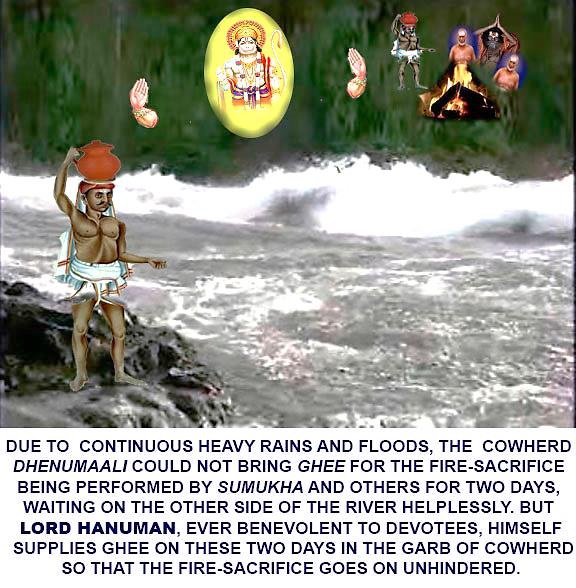
![]()

Click here to visit the Contents of the Part 1.
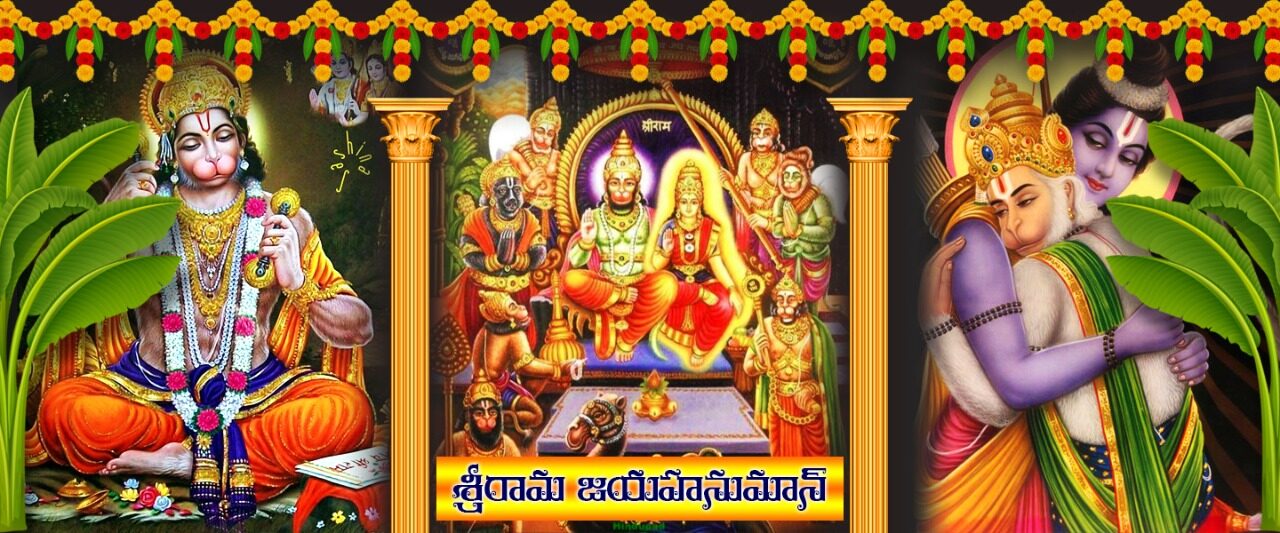




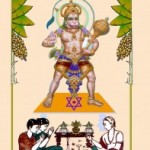

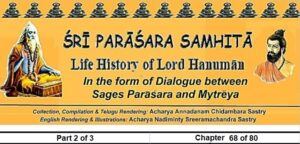
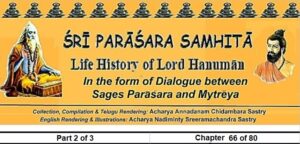
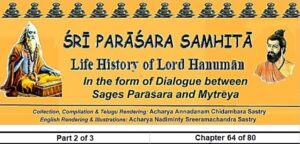
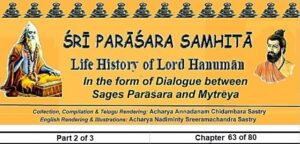
Be First to Comment